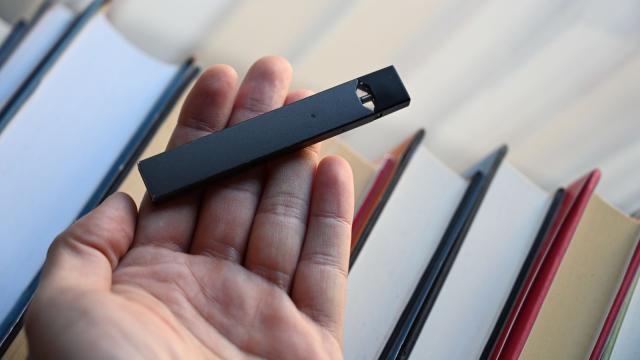There’s a lot of debate about what belongs in the classroom, but it’s safe to say Juul doesn’t. However, two teens testified in U.S. Congress on Thursday that a Juul representative had, in fact, visited their class in April 2018 as part of a health presentation and told them the company’s e-cigarettes were “totally safe.”
The testimonies are part of multiple hearings organised by the U.S. House Oversight Subcommittee on Economic and Consumer Policy, and they are meant to look into the role Juul plays in nicotine addiction among youths.
There’s more than a few disturbing details from the two teens’ testimonies. One witness, 17-year-old Caleb Mintz, said the Juul representative came to his ninth-grade classroom as part of a “mental health and addiction” seminar, in which teachers were asked to leave the room. Mintz also said the representative played to the teens’ rebellious nature by saying Juuls were “totally safe” one minute and then saying “but we don’t want you as customers” the next. Mintz also noted that a number of his classmates “sighed in relief” when the Juul representative said the e-cigarettes were perfectly safe.
The other teen, 16-year-old Philip Fuhrman, related some more disturbing tidbits from the encounter. When questioned by U.S. Democratic Rep. Raja Krishnamoorthi, Fuhrman said Mintz had asked the rep what to do if a friend — in this case, Fuhrman — was already addicted to nicotine. Not knowing that Fuhrman was the friend, the rep assumed they were talking about traditional cigarettes.
The rep reportedly told Mintz he should recommend Juul, as it was a “safer alternative than smoking cigarettes, and it would be better for the kid to use that.” According to Fuhrman, the rep then showed both Mintz and Fuhrman a Juul, though he did not use it. Furhman also testified the rep told them that the U.S. Food and Drug Administration (FDA) was about to announce that Juul was “99 per cent safer than cigarettes” and that FDA approval was imminent.
A hilarious statement, when you consider just how much the guts.
In the year-and-some-change since the botched presentation, Juul has publicly changed its tune. In November 2018, it launched an action plan to discourage teens from vaping that involved restricting flavours, deleting its social media (nearly half of its Twitter followers were teens), busting retailers who sell to kids, and introducing stricter online controls. Members of the House subcommittee, however, found Juul’s efforts to be less than impressive.
During the hearings, U.S. Congress also found Juul targeted camps and youth programs. In particular, it spent $US134,000 ($192,824) sponsoring a 5-week summer camp in Baltimore, and $US89,000 ($128,070) on a program for teens who were caught vaping in Richmond, California.
The House panel also noted that Juul targeted children as young as eight years old. According to the New York Times, Juul also gave six grants to schools and youth programs for “health and vaping prevention activities”, though it did not disclose how much and said it has since stopped doing so.
Still, the question remains: Why was Juul there at the school in the first place? According to testimony from Fuhrman’s mother, an outside group organised the presentation at the school. When questioned, the staffer responsible said she had contacted Juul’s youth prevention coordinator, who then sent the problematic representative to the school.
In an emailed statement to Gizmodo, Juul said, “The two student presentations we made were part of our short-lived Education and Youth Prevention Program which was ended in September 2018 after its purpose — to educate youth on the dangers of nicotine addiction — was clearly misconstrued.”
Juul went on to further emphasise its efforts to deter teen vaping, noting that it would “continue to develop technologies to further restrict underage access.” That still doesn’t address whether this sort of teen-baiting presentation was company-sanctioned, or if that representative is still at the company. We’ve asked Juul for confirmation about the latter and will update if we hear back.
But whatever the explanation for this is, the situation really raises the question of why a school would bring in a Juul rep, of all people, to educate kids about the dangers of nicotine. Private enterprise does not, in fact, do everything better.Â
[CNN]
